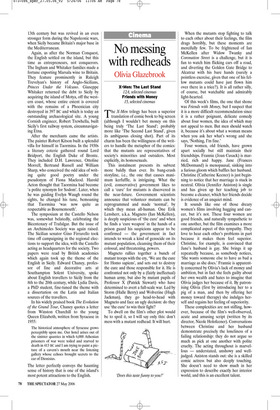No messing with redheads
Olivia Glazebrook
X-Men: The Last Stand 12A, selected cinemas Friends with Money 15, selected cinemas The X-Men trilogy has been a superior translation of comic book to big screen (although I wouldn’t bet money on this being truly ‘The Last Stand’; probably more like ‘The Second Last Stand’, given its ambiguous closing shot). Part of its charm has been the willingness of the writers to handle the metaphor of the comics: that the mutants are representatives of society’s minorities and outsiders. Most explicitly, its homosexuals.
This instalment presents its subtext more baldly than ever. Its bang-crash storyline, i.e., the one that causes maximum kerfuffle, is intriguing. What the (evil, conservative) government likes to call a ‘cure’ for mutants is discovered in the near-future. Government scientists announce that volunteer mutants can be reprogrammed and made ‘normal’, by which they mean all-human. One Erik Lensherr, a.k.a. Magneto (Ian McKellen), is deeply suspicious of ‘the cure’ and when he finds a ‘cure weapon’ in the hands of a prison guard his suspicions appear to be confirmed — the government in fact intends to wreak a kind of genocide on its mutant population, cleansing them of their colossal, and threatening, powers.
Magneto rallies together a bunch of mutant troops with the cry, ‘We are the cure for Homo sapiens’, and sets out to destroy the cure and those responsible for it. He is confronted not only by a (fairly ineffectual) human army, but also by mutant pupils of Professor X (Patrick Stewart) who have determined to avert a full-scale war. Led by Storm (Halle Berry) and Wolverine (Hugh Jackman), they go head-to-head with Magneto and face an ugly decision: do they use ‘the cure’ to win their fight?
To dwell on the film’s other plot would be to spoil it, so I will say only this: don’t mess with a mutant redhead. It will hurt. When the mutants stop fighting to talk to each other about their feelings, the film drags horribly, but these moments are mercifully few. To be frightened of Ian McKellen after Widow Twanky and Coronation Street is a challenge, but it is fun to watch him flicking cars off a road, and diverting the Golden Gate Bridge to Alcatraz with his bare hands (surely a pointless exercise, given that one of his fellow mutants could have just flown him over there in a trice?). It is all rather silly, of course, but watchable and admirably light-hearted.
Of this week’s films, the one that shone was Friends with Money, but I suspect that it is a more difficult recommendation since it is a rather poignant, delicate comedy about four women, the idea of which may not appeal to men. But men should watch it, because it’s about what a woman means when you ask her what’s wrong and she says, ‘Nothing, I’m fine.’ Four women, old friends, have grown apart socially but still maintain their friendships. Frannie (Joan Cusack) is married, rich and happy. Jane (Frances McDormand) is menopausal, sinking into a furious gloom which baffles her husband. Christine (Catherine Keener) is just beginning to notice that her marriage is stuck in neutral. Olivia (Jennifer Aniston) is single and has given up her teaching job to become a cleaner, which her friends decide is evidence of an unquiet mind.
It sounds like one of those dreary women’s films involving hugging and cancer, but it’s not. These four women are good friends, and naturally sympathetic to one another, but the film examines a more complicated aspect of this sympathy. They love to hear each other’s problems in part because it makes them feel superior. Christine, for example, is convinced that Jane’s husband is gay. She brings it up repeatedly because, as somebody notices, ‘She wants someone else to have as bad a marriage as she does.’ Frannie is apparently concerned by Olivia’s lack of money and ambition, but in fact she feels guilty about her own wealth and hates to imagine that Olivia judges her because of it. By patronising Olivia (first by introducing her to a pig of a man, and then by offering her money toward therapy) she indulges herself and regains her feeling of superiority.
These complexities are not stifling, however, because of the film’s well-observed, acute and amusing script (written by its director, Nicole Holofcener). Conversations between Christine and her husband demonstrate precisely the loneliness of a failing relationship: they do not argue so much as pick at one another with polite cruelty. The acting throughout is marvellous — understated, unshowy and welljudged. Aniston stands out: she is a skilled comic actress but also deeply touching. She doesn’t need to show much in her expression to describe exactly her interior world, and this is an excellent talent.










































































































 Previous page
Previous page